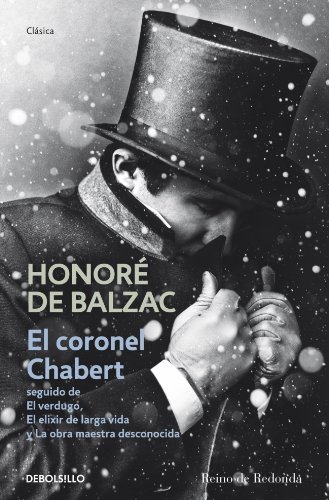
«El coronel Chabert» (1832) es una sobrecogedora novela breve que retrata una sociedad donde la justicia y el honor han perdido su significado. Chabert, héroe de las campañas napoleónicas, es dado por muerto en la batalla de Eylau y arrojado a una fosa. No obstante, el coronel recobra el conocimiento y consigue salir de la tumba. Como si fuera un espectro, regresa a París para reclamar una identidad que nadie le reconoce. Y menos aún su esposa. Completan el volumen tres cuentos magistrales: «El verdugo», un macabro episodio de lealtad familiar ambientado en España durante la guerra de la Independencia; «El elixir de larga vida», una alucinada versión del mito de Don Juan, y «La obra maestra desconocida», que relata los intentos de un pintor por reproducir la esencia de una mujer. Esta edición, que se presenta en impecable traducción de Mercedes López-Ballesteros, se complementa con los apéndices con los nombramientos del Reino de Redonda que se publican al final del texto.
Author

Honoré de Balzac was a nineteenth-century French novelist and playwright. His magnum opus was a sequence of almost 100 novels and plays collectively entitled La Comédie humaine, which presents a panorama of French life in the years after the fall of Napoléon Bonaparte in 1815. Due to his keen observation of fine detail and unfiltered representation of society, Balzac is regarded as one of the founders of realism in European literature. He is renowned for his multi-faceted characters; even his lesser characters are complex, morally ambiguous and fully human. Inanimate objects are imbued with character as well; the city of Paris, a backdrop for much of his writing, takes on many human qualities. His writing influenced many famous authors, including the novelists Marcel Proust, Émile Zola, Charles Dickens, Gustave Flaubert, Henry James and Jack Kerouac, as well as important philosophers such as Friedrich Engels. Many of Balzac's works have been made into films, and they continue to inspire other writers. An enthusiastic reader and independent thinker as a child, Balzac had trouble adapting himself to the teaching style of his grammar school. His willful nature caused trouble throughout his life, and frustrated his ambitions to succeed in the world of business. When he finished school, Balzac was apprenticed as a legal clerk, but he turned his back on law after wearying of its inhumanity and banal routine. Before and during his career as a writer, he attempted to be a publisher, printer, businessman, critic, and politician. He failed in all of these efforts. La Comédie Humaine reflects his real-life difficulties, and includes scenes from his own experience. Balzac suffered from health problems throughout his life, possibly due to his intense writing schedule. His relationship with his family was often strained by financial and personal drama, and he lost more than one friend over critical reviews. In 1850, he married Ewelina Hańska, his longtime paramour; he passed away five months later.